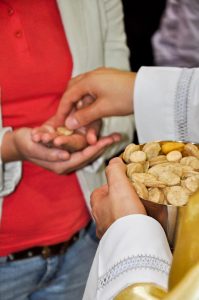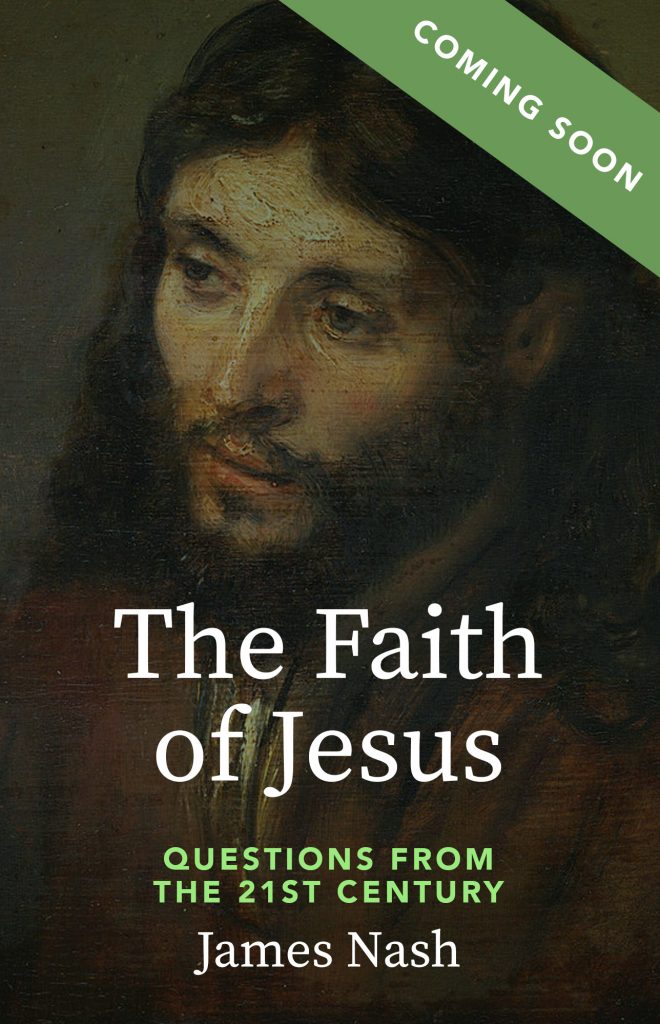Gen 14:18-20; I Cor 11:23-26; Luke 9:11b-17
The Solemnity of the Body Blood of Christ – June 19

On Corpus Christi we Catholic celebrate the Real Presence of the body and blood of Jesus Christ in the bread and wine of the Eucharist.
This is tough even for most Catholics to believe. A 2019 study conducted by the Pew Research Center found that just 31 percent of U.S. Catholics they surveyed believe that the bread and wine in the Eucharist become the body and blood of Christ. Instead of believing in the Real Presence, 69 percent of the Catholics surveyed reported they believe the bread and wine “are symbols” of the body and blood of Jesus. A majority of Catholics in every age group reported this belief that the Eucharistic bread and wine are https://www.pewresearch.org/fact-tank/2019/08/05/transubstantiation-eucharist-u-s-catholics/
All the same, I do believe in the real presence of Jesus’ body and blood in the sacrament.
Why Believe in the Real Presence of Jesus’ body and blood?
I start with the fact that this belief has been part of our Christian tradition from the very beginning. That’s a good point of departure, but it’s not enough. For me the key to accepting this mystery is to ask what the Eucharist means.
During the Last Supper as he broke bread with his friends and as Jesus prepared himself to die, his final command to the disciples, including us, is “Do this in my memory.” (Lk 22:19; I Cor 11:24) Now, when someone tells us to do something just before he dies, we feel a powerful obligation to obey the command. And in fact, probably no command of Jesus has been followed so universally for the past two thousand years as this one. Mass has been said millions of times all over the world for a very long time.
Why did Jesus command us to do this? And why has the Holy Spirit seen to it that we obey it so faithfully?
The most obvious answer is that the mass is a reenactment of Jesus’ sacrificial death on the cross. The mass is first a reminder that Jesus practiced what he preached: he sacrificed his life out of love for us. His message was always: to find real life you must give it up in loving service to others. He did this throughout his ministry, and ultimately on Good Friday.
Jesus’ death on the cross happened once in history, a long time ago. The question for us is: does Jesus’ death still mean anything to us 2000 years later? Does Jesus’ message still change lives? Or is it just one more obscure event that happened long ago and far away?
For believers, the answer is No! We make Jesus’ sacrifice present now sacramentally. We have to make it real and present now if we are to change our lives, abandon our selfish habits in order to follow him and find life through loving sacrificial service to others.
Why will nothing less than Jesus’ real presence do? I am reminded of a question once asked by a liturgical theologian. “What good is it if the bread and wine are transformed but we are not?” We could also ask this question the other way around. If we are just eating the bread and wine we have offered, how will that change our lives? The gospel is about changed lives.
Why did Jesus want us to “do this in memory of me?” I think because he wanted us to have life and have it more abundantly (John10:10).
Jesus tells us that to gain your life, you must give it up. Mt 10:39 par; Jn 12:25. Jesus, “the man for others,” did this throughout his ministry with loving service to those who needed help. The culmination of his life was the total self-giving of his death on the cross. This is the real meaning of the eucharist.
Dying to self to live for others is not easy, it does not come naturally for most of us. We need God’s grace to move in this direction. By eating and drinking Jesus’ flesh and blood we physically participate in Jesus’ total self-giving. This is very strong medicine! What could be a stronger challenge to our natural tendency to put ourselves first? But I know I need medicine this strong to nudge me in the right direction, the direction of life. Even with medicine this strong, progress can be slow, at least in my case.
Still, I can tell you receiving the blessed sacrament regularly, at least twice a week for many years, has helped me to move toward more abundant life. I may not be ready yet to die a horrible death, as Jesus was. But at least I feel I am more open to making the small sacrifices that give life “more abundantly.” With God’s grace, after a while some “sacrifices” do not feel like sacrifices any longer. Thanks be to God!
The great 20th century Catholic novelist Flannery O’Connor was once at a New York dinner party when the discussion turned to the real presence of Christ in the bread and wine at mass. The consensus of the Manhattan intellectuals at the party was that Jesus is present symbolically. “If it is only a symbol, then the hell with it!” Flannery replied. Now, how can we help those 69 percent of our fellow Catholics to understand what they are missing?



Excellent post. I certainly love this website. Continue the good work!